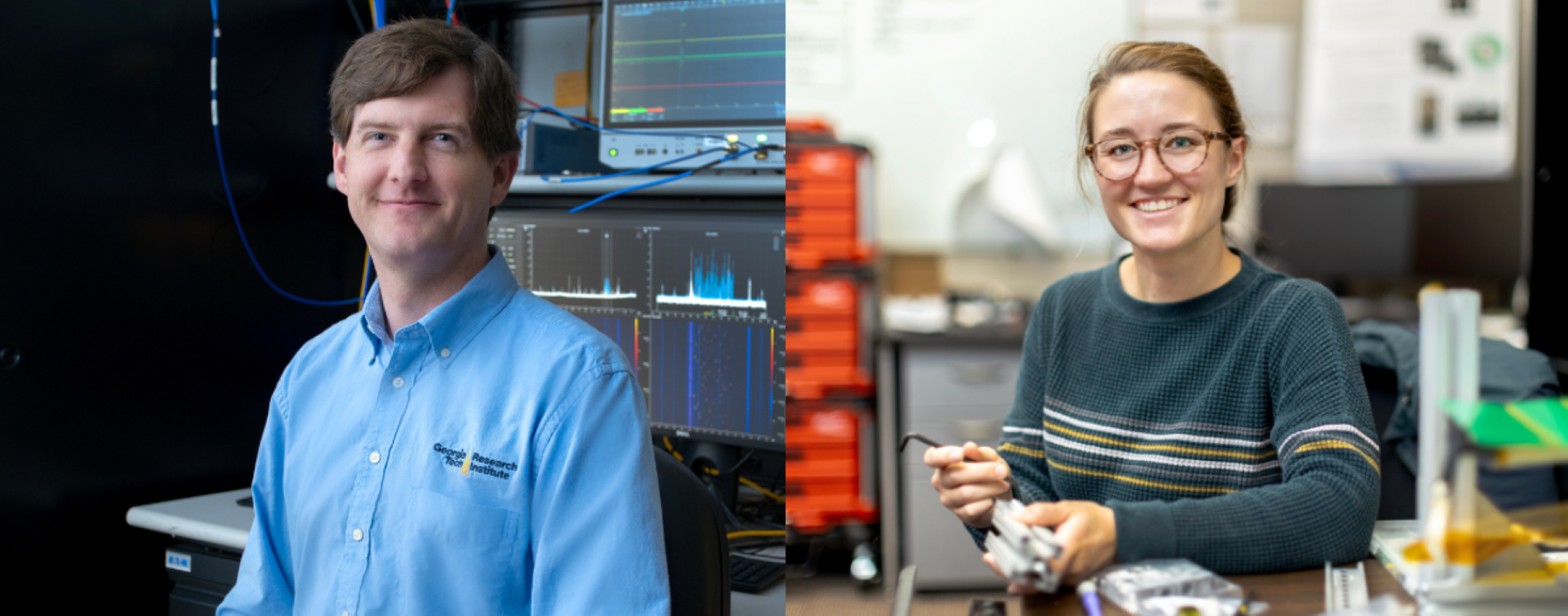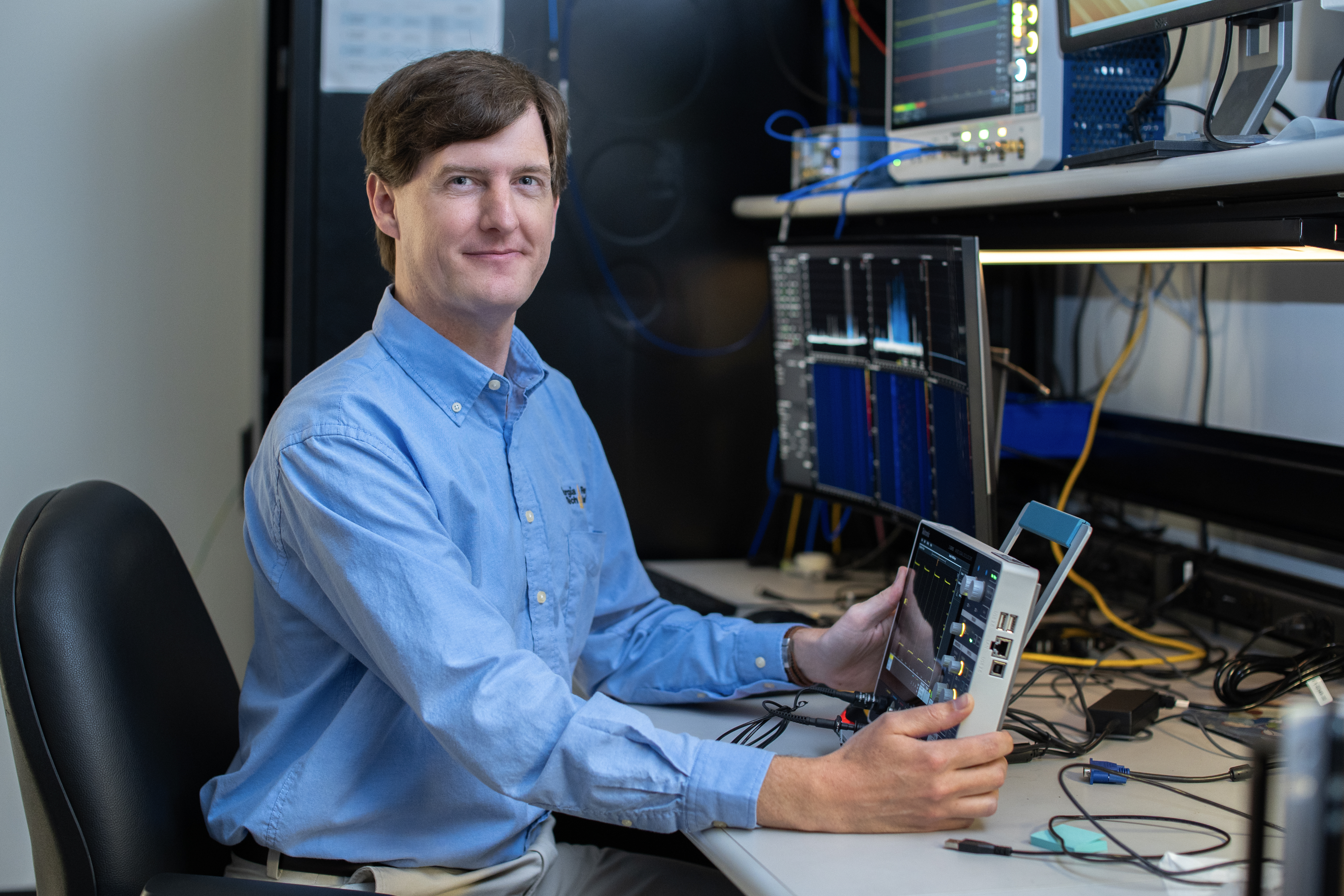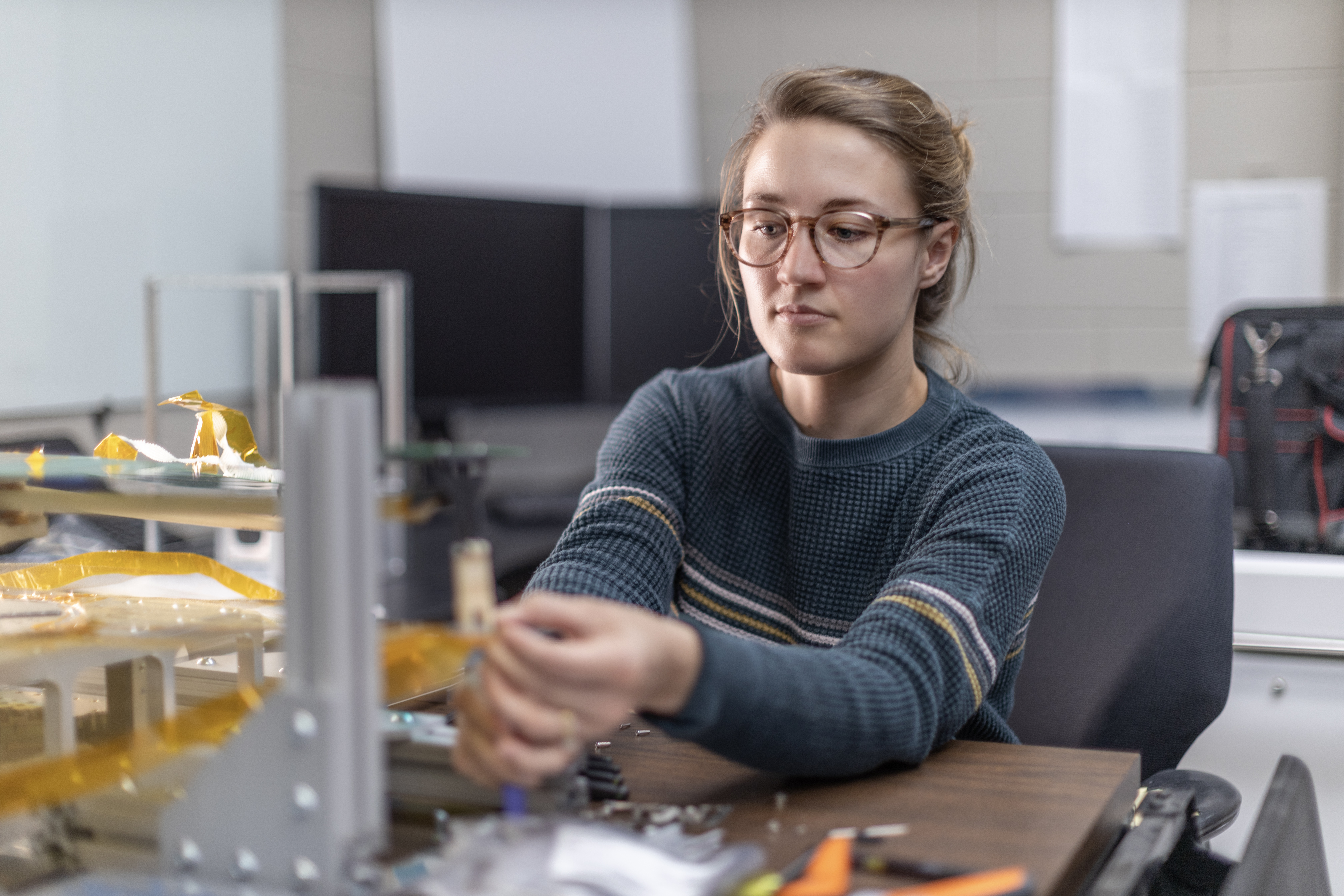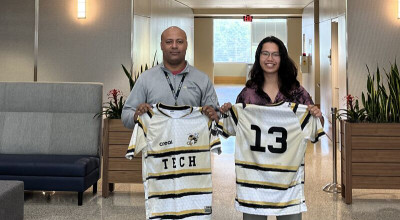
This spring, the Georgia Society of Professional Engineers (GSPE) presented awards at the 2024 Georgia Engineering Awards to esteemed individuals who have demonstrated excellence in engineering. Among the nominees and winners were Georgia Tech Research Institute (GTRI) Principal Research Engineer in the Sensors and Electromagnetic Applications Laboratory (SEAL), Ryan Bales, and Mary Kate Broadway, Student Assistant in the Electro-Optical Systems Laboratory (EOSL). Bales was nominated and selected as Engineer of the Year in Government. He was presented with his award at the 2024 Georgia Engineering Awards in February. Broadway was nominated for the Engineering Student of the Year Award.
In recent interviews, Bales and Broadway shared their educational backgrounds, professional accomplishments, and sentiments regarding their GPSE accomplishments.
Ryan Bales
Bales received his master of science degree in electrical engineering and his bachelor of science degree in computer engineering with honors from the University of Missouri-Rolla (now Missouri University of Science and Technology). In 2008, Bales joined GTRI as a Graduate Research Assistant. During that time, he was pursuing his Ph.D in embedded video surveillance.
After completing his Ph.D, he started working in SEAL in the Sensor Systems Engineering Division (SSED) in 2012. He serves as the SSED's chief scientist, specializing in field-programmable gate array (FPGA) and embedded system design for electronic warfare applications.
He is a senior member of the Institute of Electrical and Electronics Engineers (IEEE) and a professional engineer licensed in Georgia. IEEE is the leading professional association for electronics engineering, electrical engineering, and other related disciplines. He is active in IEEE-HKN, the honor society of IEEE, and in the IEEE Aerospace and Electronic Systems Society (AESS).
Bales serves as the 2024 President of HKN and was elected to the HKN Board of Governors for the 2020-2022 term. He has served on several committees during his tenure. He has also previously served as treasurer and chapter chair for the IEEE AESS (Aerospace and Electronic Systems Society)/GRSS Joint Chapter. He shared that “getting involved in professional societies is a great way to meet experienced engineers in your field, get a sense of what different career paths look like, and start contributing to your technical community.”
Nominations for the GSPE awards require detailed submissions. Bales expressed gratitude to the colleagues who took the time to nominate him. He said that "this recognition was enabled in no small part by the culture and opportunities that GTRI provides for working on so many innovative and impactful projects.”

Bales' Advice for Engineering Professionals
According to the Bureau of Labor Statistics, overall employment in architecture and engineering occupations is projected to grow faster than the average for all occupations from 2022 to 2032. Bales offers advice to professionals pursuing this rapidly growing field.
“Engineering is an awesome field, and there are few professions that allow us to use our skills and talents so directly to benefit the world around us. An engineering career can enable you to not only provide for yourself and your family but also contribute to your community as well,” says Bales.
Mary Kate Broadway
Broadway is pursuing a Bachelor of Science in Materials Science and Engineering from Georgia Institute of Technology. She previously attained a Bachelor of Fine Arts (BFA) in Animation and Digital Arts from Florida State University in 2017. She spent five years working in the film and entertainment industry as a 2D and 3D artist, and as a fabrication generalist for stop-motion animation. Her credits include Netflix's "Wendell and Wild," Adult Swim's "The Shivering Truth," and BBC's "Moon and Me."
Mary Kate’s time in fabrication inspired her to pursue engineering. In 2022, she began working as a student assistant for EOSL. Since then, she has had the opportunity to combine art and science to many engineering challenges. She frequently uses her background in design to create Operation View 1's (OV-1's), conceptual art, and animations for project realization; additionally, she applies her education in engineering to the design, simulation, and fabrication of opto-mechanical assemblies. In 2023, she received GTRI’s Undergraduate Student Research Award.
Broadway expressed her surprise and gratitude at receiving a nomination for the GSPE Engineering Student of the Year Award. She also thanked everyone at GTRI who nominated her. She went on to say that "changing career paths has been accompanied by a lot of uncertainty. As a person who was an outsider to the sciences for a long time, the opportunity to be recognized for my contributions within the field of engineering is incredibly meaningful.”

Broadway's Advice for Engineering Professionals
When asked what advice she would give to individuals pursuing engineering careers, Broadway said that many students feel the pressure to commit to a pathway early. While she believes there is a benefit to being strategic about one’s pursuits, she also believes there is much to gain from exploring a variety of interests and maintaining creative flexibility.
“I’ve found there’s so much to be gained from considering a various interests, especially in how those interests contribute to finding unique solutions to complex problems,” says Broadway. She encourages engineering students and professionals to “take the time to be curious, be open to unlikely paths, and explore for the sake of it.”
About the Georgia Society of Professional Engineers
The GSPE is the leading state organization that promotes the engineering profession to protect public health, safety and welfare. The organization provides professional development and networking opportunities for members in the state of Georgia. GSPE also recognizes and honors engineers who make exceptional contributions to the profession.
Writer: Madison McNair (madison.mcnair@gtri.gatech.edu)
GTRI Communications
Georgia Tech Research Institute
Atlanta, Georgia USA
The Georgia Tech Research Institute (GTRI) is the nonprofit, applied research division of the Georgia Institute of Technology (Georgia Tech). Founded in 1934 as the Engineering Experiment Station, GTRI has grown to more than 2,900 employees, supporting eight laboratories in over 20 locations around the country and performing more than $940 million of problem-solving research annually for government and industry. GTRI's renowned researchers combine science, engineering, economics, policy, and technical expertise to solve complex problems for the U.S. federal government, state, and industry.



